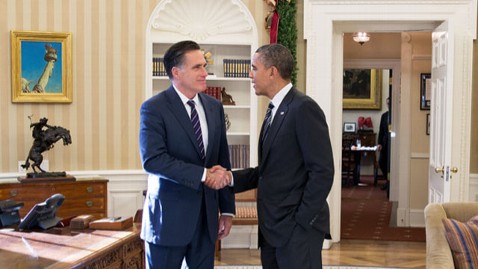How does one come up with $4 trillion in revenue and spending cuts?
That's the question members of Congress, the Obama administration and fiscal experts around the country are grappling with as "fiscal cliff" talks continue to stall.
The fiscal cliff is a combination of the soon-to-expire Bush tax cuts coupled with a series of deep budgetary cuts to defense and domestic programs- the ultimate goal of which is to help stabilize the deficit going forward. While there is no exact amount of savings and revenue that would stabilize the country's debt- the number varies somewhat depending on who you ask- the generally agreed upon range is around $4 trillion.
Republicans and Democrats are drawing lines in the ideological sand. Democrats want to let the Bush tax cuts expire for the highest income earners, effectively raising tax rates on the top 2 percent of earners, which Republicans oppose. Republicans want to look at entitlement reforms- Medicare, Medicaid, Social Security, which Democrats oppose. The seemingly staunch stands beg the question--is there any way to reach a deal that would start to generate close to $4 trillion that does not involve raising taxes or reforming entitlement programs?
It's fiscally possible, but it's inconvenient and unlikely.
There are a series of trims that the government could make to the budget that would save a few billion here and there. Ideas that have been suggested include doubling the airline fee for a non-stop flight from $2.50 to $5, reforming our immigration detention programs, and prison reform.
Fiscal Cliff: What Republicans, Democrats Agree on So Far Watch Video
'Fiscal Cliff': John Boehner Makes Counteroffer Watch Video
Washington, D.C., Gridlocked as Fiscal Cliff Approaches Watch Video
But those ideas don't generate a great deal of savings in and of themselves. The airline fee increasing for example, it's estimated that raising the non-stop flight fee to $5 would only generate an additional $1 billion a year--$10 billion over the course of 10 years.
Prison reform is another avenue of savings. A study from the Vera Institute of Justice released in January, 2012 showed that in the fiscal year of 2010 the total cost for taxpayers of the nation's federal prisons was $39 billion--which was a little more than $5 billion more than the states' combined corrections budgets that year. The cost of an inmate per taxpayer on average was $31,286.
Reforming the system could trim that cost, but it's a complicated endeavor that lacks a single, or even simple handful of solutions, and at the end of the day wouldn't generate the hundreds of billions of dollars in savings needed to begin approaching the trillions in savings and revenue the government is looking for.
Those big savings, experts point out, are found in entitlements and taxes.
"The high-end Bush tax cuts generate a trillion dollars over 10 years. That's a quarter of the task of stabilizing the debt...That's achievable," said Chuck Marre, director of Federal Tax Policy at the Center on Budget and Policy Priorities. "If they just pass the tax cuts for 98 percent of the people only, by default that (revenue) happens and that's significant. Then you need to figure out where does the rest of the money come from?"
And a significant area where that money comes from, experts suggest, is entitlement spending.
"I'm sure there are some small programs that could be eliminated or curtailed but it would be a drop in the ocean of spending represented by entitlements," said Isabel Sawhill, a senior fellow at the Brookings Institution.
Social Security, Medicaid and Medicare, are categorized as mandatory spending in the government's fiscal budget. In the 2010 fiscal year 55 percent of the budget went to mandatory spending. Within that 55 percent, Social Security, Medicare and Medicaid made up a total of 71 percent combined, according to figures from the Center on Budget and Policy Priorities.
It's these avenues that will likely be the quickest and least complicated means of generating the savings necessary to stabilize the debt. Of course, the irony is, these avenues are also the most politically sacred, making a simple and painless fix to the problem effectively impossible.










